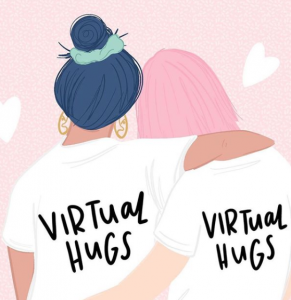By Evelyn Pechter, Psy.D.
Bob Dylan was right — there are all kinds of changes that come. Layers upon layers of change. Among those layers are welcome changes: for example, a new baby in the family, a new son or daughter-in-law. These changes can allow for a smile and fond memories. Then there are changes that are not so welcome. The ones that cause great pain and grief — the primary losses: the death of a spouse, or a parent or anyone, near or far. Then there are secondary losses: the lack of physically getting together with friends and family, the change of everyday routines, such as going to the market, and feeling fearful if someone gets closer than six feet, and a list that grows.

Now let’s give CHANGE a chance and look at what the layers might look like, with a new spin.
C.H.A.N.G.E. can be about:
CARE
HUMANITY
ADAPTING
NORMALCY
GRATITUDE
EMPATHY
CARE: the people you care about and those that care about you, whether near or far.
HUMANITY: During the grief of the death of a loved one or a pandemic, the Humanity of people comes through. Together is better, even if virtually on a computer or phone.
ADAPTING: Change means adapting to what is, whether it’s the change you welcomed or the change you definitely didn’t want.
NORMALCY: What was a normal day, is not so normal now. Finding ways to have a sense of normalcy during grief and loss is a challenge, yet doable.
GRATITUDE: There is much to show gratitude for, a neighbor who brought groceries to your door, the mail person who still does the job of bringing the mail. Look around and see all that is going on, trees are growing leaves, rain still falls, the phone rings with a friend inquiring about you.
EMPATHY: Being in another person’s shoes, seeing through another person’s eyes, isn’t that what HOPE Connection Grief Group members do every meeting? It’s happening now, even on Zoom!
Adapting might also mean an attitude shift. An attitude shift allows you to recognize the reality of what is okay in this present moment while you grieve. I didn’t say that would be easy. It is doable with practice, awareness and taking a good breath, a breath that says, “I’m okay in this moment.” Adapting is a healthy way to cope.
I’m about to sound a bit like Sesame Street with the alphabet, so let’s try this and without puppets. The letter “S” stands for Self-Compassion: It’s so important, especially now in a scary time of change and so much unknown. Self-Compassion can be the voice inside you that says “Stop worrying. I’m going to go read a book, call a friend or watch a movie. I’m going to be easy on myself right now.” Thus, you have another opportunity for a good breath and a reflection for gratitude.
I don’t know if they ever played bingo on Sesame Street, but let’s have a bingo moment.
Ask yourself right now, “what’s my attitude today? “
If you can say, “I’m feeling pretty good today, the sun is shining, the birds are singing,” then say “BINGO!”
Now, you have your attitude moving in the right direction.
How do you feel when you yell “Bingo?” Do you giggle? Are you pleased with yourself?
Maybe you just feel surprised! Isn’t that a better way to have a good day? Even now, your life can have more bingo days. (Hmm, I wonder If anyone plays bingo on Zoom?!) Seriously, checking and maybe changing your attitude is the gift you give to yourself. It can provide you with the sense of control to feel empowered.
Remember, with each breath you take, you have a moment by moment opportunity to challenge yourself and comfort yourself. Think of the acronym C.H.A.N.G.E. You can embrace all of the letters and ALL of the BINGO moments too!
Empower yourself with each breath. Nurture and treasure each moment.
“Nothing in the world is more exciting than a moment of sudden discovery, or invention, and many more people are capable of experiencing such moments than is sometimes thought.” — Bertrand Russell

